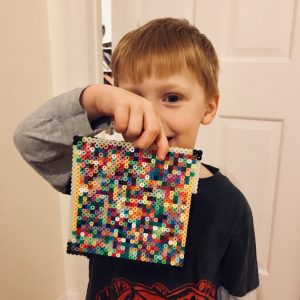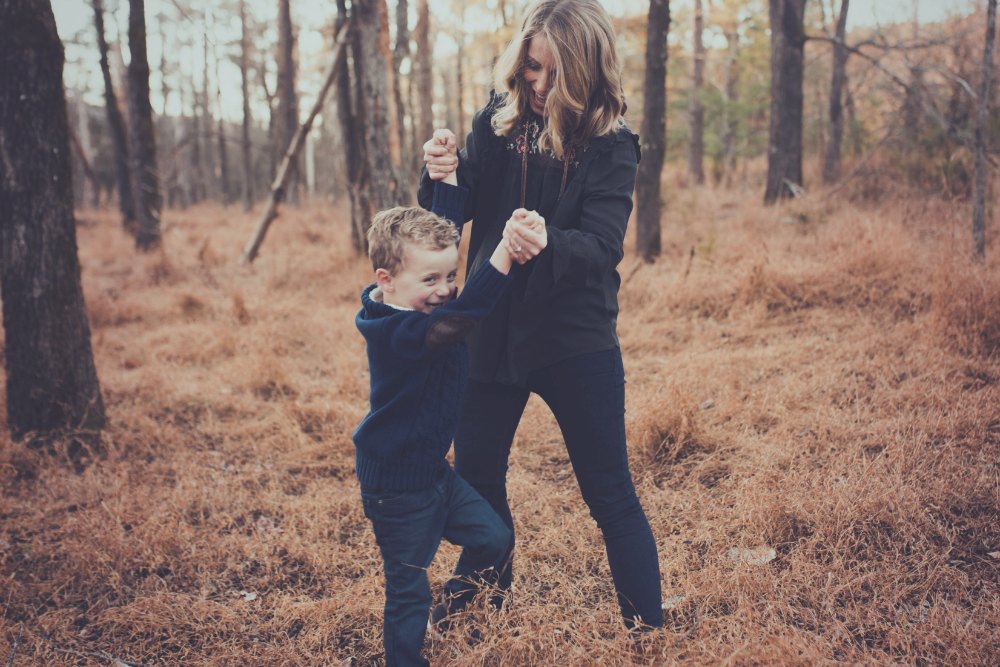“Therefore, to play like a child, bungle. Blunder. Stumble. Be unable to figure out why the square piece won’t fit in the round hole. Risk looking silly, sing, fall over. Exaggerate everything. Lighten up. Try to have fun.” ~ From Playful Parenting by Lawrence J. Cohen, Ph.D.
 My son loves these melty beads. He is a busy 4-year-old, but he will work diligently for days to make his masterpieces. This is his “beautiful square.” There’s something precious about hearing your child describe something s/he did as beautiful.
My son loves these melty beads. He is a busy 4-year-old, but he will work diligently for days to make his masterpieces. This is his “beautiful square.” There’s something precious about hearing your child describe something s/he did as beautiful.
Fast forward from that sweet moment to a tough night of solo parenting my three children. (Let me pause here to honor all the single mamas and papas doing this difficult job every single day!) You all know how this goes: lots of whining, complaining and flat-out defiance. Everyone was primed for full meltdown, especially when I told that same temporarily-not-so-sweet preschooler that he could not, in fact, eat a granola bar for dinner. The “beautiful square” was sitting within eyesight, and my angry little guy grabbed it, ready to break it in half.
Some nights, the tension would have continued until they were all asleep. A series of frustrations, consequences and gritting my teeth to get through snuggle time. That night, however, I was able to “keep my lid on,” as Dan Siegel would say.
I scooped him up, flailing legs and all, and marched him out of the room. With a little silliness in my voice, I said, “You’re running even though your feet aren’t touching the ground!” He looked at his legs and stopped screaming long enough for me to pretend to fly him into his room, where he promptly remembered he was still mad. We were at the edge of his bed, and I started to make his stuffed animals jump around and talk to him. Before long, stuffed animals were flying everywhere, and we were both laughing and having a great time together. It was magical. He got ready for bed without complaint, and he went to bed feeling happy and loved. It changed my night as well. Instead of carrying frustration into the evening, I had a smile on my face and affection in my heart for my strong-willed little one.
Were your parents ever playful like this with you? If not, it can feel awkward or intimidating to try. You might even feel like you’re letting your child get away with something, or rewarding bad behavior. Actually, playful parenting can save your sanity and help build healthy connections in your child’s brain.
How playfulness can build healthy brains.
In their book The Neurobiology of Attachment-Focused Therapy, psychologists Baylin and Hughes write, “Play appears to engage a cocktail of brain chemistry that helps make it a powerful social process.” They further explain that play promotes brain development, especially in the crucial prefrontal cortex or “upstairs brain,” which is the home of executive functioning, healthy social skills, impulse control, creativity and joy. I don’t know about you, but we could use more of all those things in my family!
In many ways, laughter really is the best medicine. Neuroscientist Jaak Panksepp found that laughter stimulates feel-good chemicals in the brain (opioids and dopamine). Laughter relaxes the body, reduces pain, increases positive feelings and improves relationships. Playfulness and laughter help caregivers stay in “upstairs brain” mode by lowering stress and diffusing anger. Play has been shown to enhance cognitive function in adults as well as kids! Therefore, when you choose playful parenting, not only are you nurturing healthy connections in your child’s brain, but your brain will reap the benefit as well.
How to playfully parent. Some ideas …
Parenting is hard work. While it may take more energy at first, playful parenting is often more effective, and rewarding, in the long run. Here are some ideas to get you started:
- Sing.
- Use counting games, rhythm and rhyme – watch a good pre-school or elementary teacher to learn from the masters.
- Be a team.
- Race each other (playfully) to get things done.
- Set up a code word for repeat challenges. For example, if your child frequently whines about an activity, set up a silly code word like “purple pumpkins” that you can say when the whining starts instead of trying to reason or getting angry.
- Talk in a silly or exaggerated voice.
- Incorporate sensory play. For example, when it’s time to get ready for bed, bear crawl, crab walk or hop like kangaroos toward the bedroom with your child.
- Don’t take yourself too seriously.
And another idea – the ‘love mark’.
Not everyone feels comfortable or confident in their ability to be a playful parent. Remember, play doesn’t always have to be silly. You can try starting small, like using a little playful tactic called the “love mark.” To do this with your child, offer a marker or two and let your child draw on your hand, wrist, shoulder – wherever you feel comfortable. You can then draw on them with the same marker and remind them that you both have a little piece of each other all day, even when you’re separated. Follow @rileythebrave on Facebook and Instagram for more ideas with our #playfultuesday posts.
Playful parenting with teens.
Remember, playfulness isn’t just for kids! With teens, you might just inject a little humor, like “I know, I’m just so mean! I want you to leave your phone on the counter and deprive you of all the fun in your life. It’s almost like I want you to get enough sleep and not be addicted to electronics. Ugh, just the worst.” This is a more effective method of letting your teens know why you set limits than launching into a lecture, which they won’t hear anyway. Quick caution: be sure your tone is light-hearted and not sarcastic or you won’t get quite the same effect.
When stress gets in the way.
Take a moment to think of the last time you were really frustrated with your child. Are your thoughts racing to the negative? Do you feel any tension in your jaw or shoulders? Your brain and body can get stuck in a cycle of stress that makes power struggles and conflict more likely. Let’s press pause on that cycle!
- Take a deep breath in.
- Hold it while let your forehead and jaw relax.
- Release your breath with a long exhale.
- Let your cheeks turn up in a little smile.
What do you notice? In that 10-second exercise, you sent powerful signals to your brain and body that it doesn’t have to be in fight-or-flight mode! Just think how you would feel if you did that every day, or several times a day! Besides pressing pause during a moment of frustration, it’s also helpful before things get heated, like before transitions or difficult conversations, after school and any time you need a little reset for your mind and body. The more you practice, not only will you feel calmer, but you’ll be modeling a powerful self-regulation tool for your child.
Finally …
You’re not always going to feel like being playful. Some nights, neutral is the best you can muster. Take a breath, remind yourself that it’s okay to stumble, and then try again. Maybe you’ll be able to turn meltdown central into a super-fun stuffed animal fight too. If not, at least you can have some fun trying.
About the Author: Jessica Sinarski, LPCMH
 Jessica Sinarski, LPCMH is a clinical supervisor, consultant, author and educator. She is a thought-leader in connecting neuroscience with practice in adult-child relationships. Areas of expertise include trauma-informed care, child development and brain-based practices. Jessica has trained thousands of parents and professionals across the country. For more information and a list of recent workshops, visit www.JSinarski.com. Her books Riley the Brave and Raily el valiente (Spanish edition) are available on RileytheBrave.org with additional free resources for parents, teachers and other caring adults. Also available on Amazon.com.
Jessica Sinarski, LPCMH is a clinical supervisor, consultant, author and educator. She is a thought-leader in connecting neuroscience with practice in adult-child relationships. Areas of expertise include trauma-informed care, child development and brain-based practices. Jessica has trained thousands of parents and professionals across the country. For more information and a list of recent workshops, visit www.JSinarski.com. Her books Riley the Brave and Raily el valiente (Spanish edition) are available on RileytheBrave.org with additional free resources for parents, teachers and other caring adults. Also available on Amazon.com.



Leave a Reply